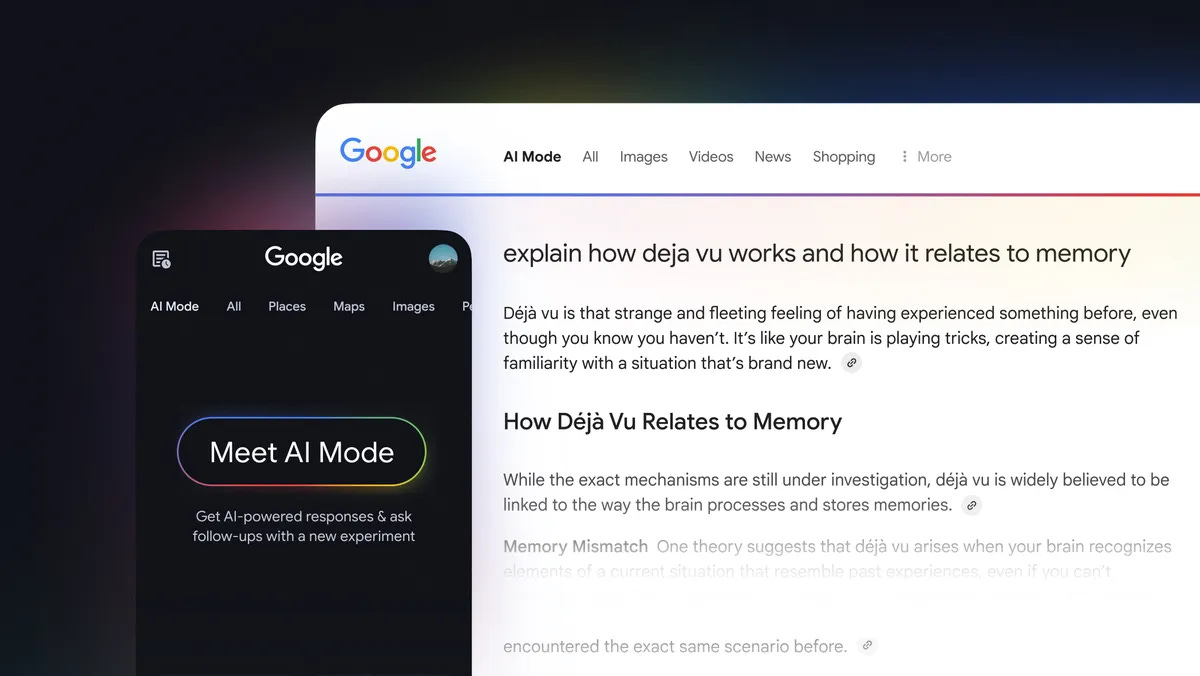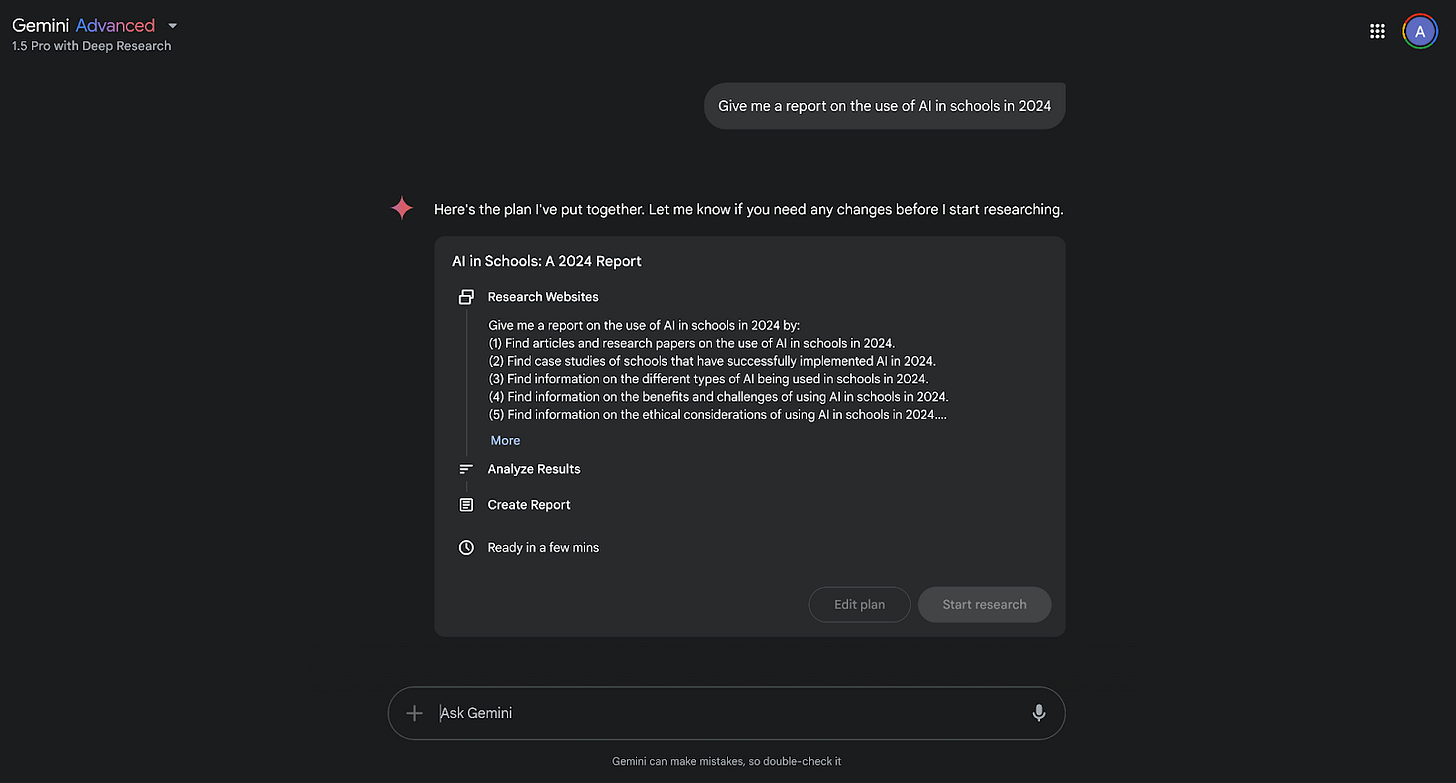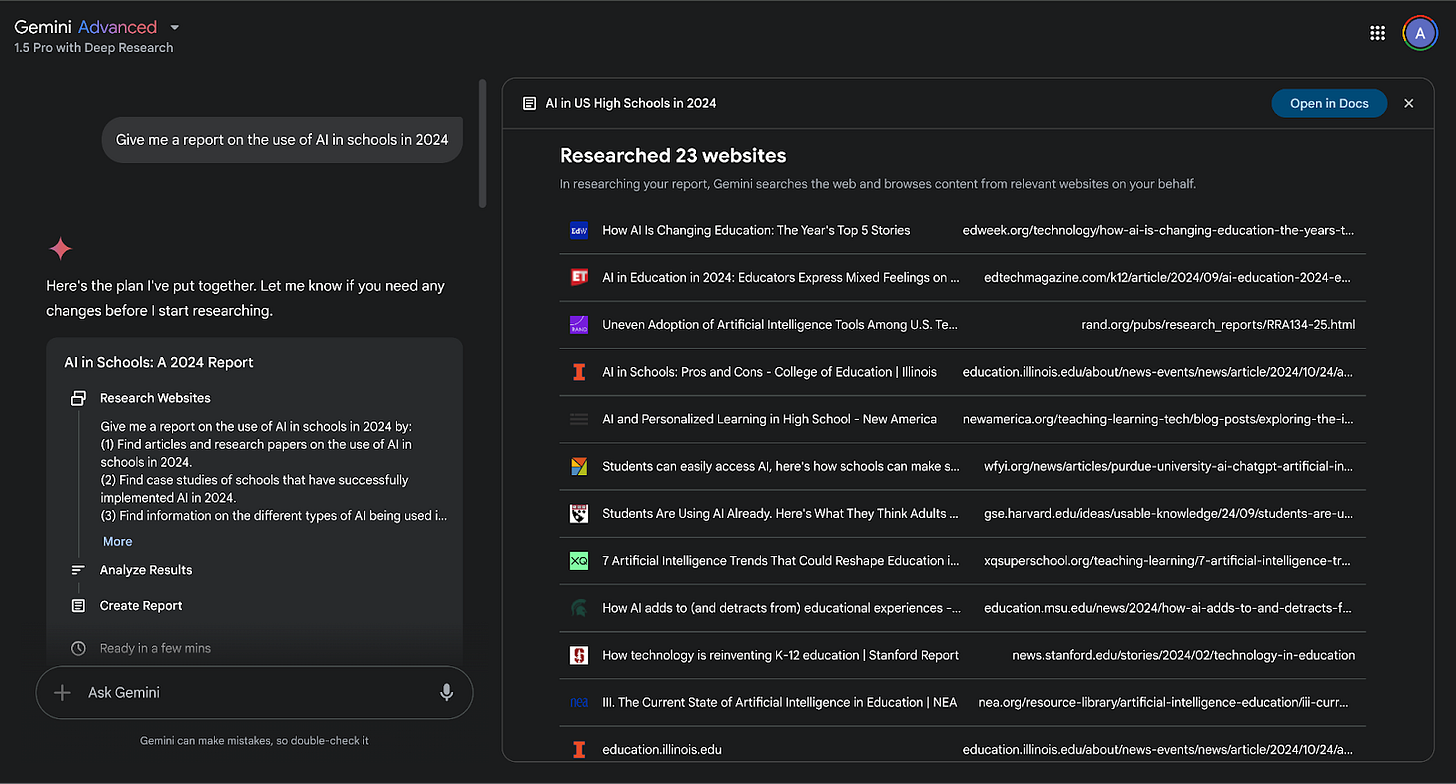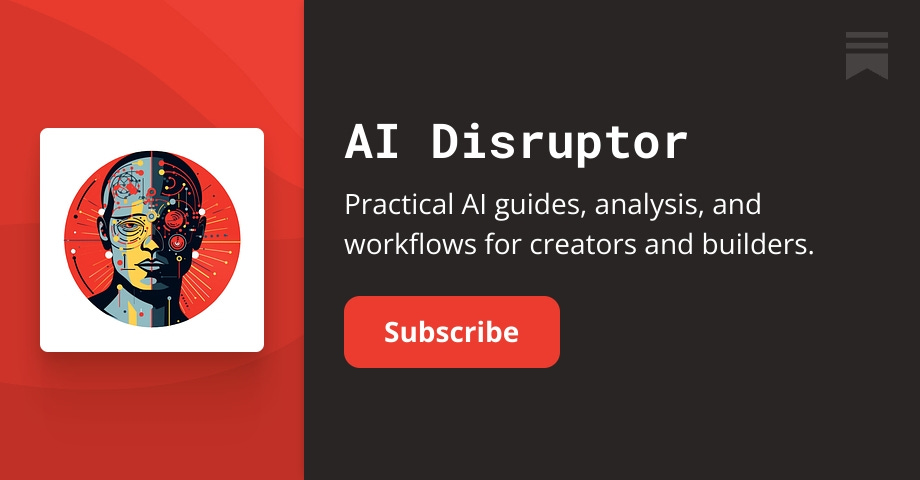Welcome Back!
I’m looking for guest contributors who enjoy writing guides (with video sections) so if you are interested kindly DM me on LinkedIn. I’m looking for guides on AI agent frameworks, Vibe coding and new takes on the most popular chatbots and AI tools.
Why 2025 just feels Different?
In 2025, we are graced with even more advanced search capabilities than previously. It’s a rather radical departure if you’ve been following along - for Search & research experiences broadly speaking.
Today I’d like to go over some of the major ones I’ve noticed, as we repost Alex McFarland ‘s guide on Deep Research (video above, and text continues below). Google yesterday announced it’s testing a new AI search capability called AI Mode. I think in the history of Search and AI, this is sort of a big deal.
🔎 What is Google AI Mode?
This mode allows users to ask complex, multi-part questions, enabling more nuanced and comprehensive answers compared to traditional search functionalities.
AI Mode is rolling out to Google One AI Premium subscribers starting this week and is accessible via Search Labs, Google’s experimental arm.
🌌 What is Grok 3 DeepSearch?
Grok 3 DeepSearch is an advanced feature of the Grok 3 AI model, designed to function as a sophisticated research agent. This tool leverages real-time data from the web as well as insights from the platform known as X, making it capable of synthesizing information and providing detailed reports on various topics.
You can only access Grok DeepSearch through the X platform (website or app).
Grok also has a Think mode, similar to Anthropic’s Extended thinking.
🎯 Anthropic’s Search Tool Features and Capabilities
Anthropic is actively developing a robust web search feature for its AI model, Claude, which will significantly enhance its capabilities by allowing access to real-time information online.
It has not been announced or released yet, but in theory would be similar to ChatGPT Search.
🎓 Perplexity News
The search & research tool Perplexity has made many interesting announcements in recent times, including a browser called Comet. Comet is designed with a focus on what Perplexity refers to as "agentic search." This feature allows the browser to not only retrieve information but also to perform tasks autonomously.
A few days ago, Perplexity announced an updated Voice mode with additional features on its iOS app.
To Summarize
Google AI Mode
Grok 3 DeepSearch
Anthropic’s Search is coming
OpenAI has ChatGPT Search
Perplexity is improving its offering
Reasoning models
OpenAI’s o1 and o3 model has ushered in a new era of reasoning models implicated also as an additional layer in our research. This is clearly what makes OpenAI Deep Research so great. However now Grok 3, Claude 3.7 Sonnet and GPT-4.5 also add their own strengths into the mix, although GPT-4.5 isn’t a reasoning model, Claude 3.7 Sonnet is a hybrid reasoning model. Some users also really like Grok 3.
These new layers of search, research and reasoning models in 2025 are changing the interface of how we do Search. We knew 2025 was going to be excited on the search capabilities front, but it’s starting to really feel different to the internet that came before, it’s a noticeable departure from past consumer behaviors.
💬 Google AI Overviews Increases
Additionally Google has improved its AI Overviews substantially with Gemini 2, overall with Gemini 2.0’s advanced capabilities, they provide faster and higher quality responses and are live in more countries. This will also change the SEO rules meaning a more synthetic AI-knows-best internet for reponses.
Why Use Grok 3’s DeepSearch?
Alex has a lot of incredible guides too around these and other AI tools. I’m a fan of his videos and I’m always bugging him for ideas on new guides.
How to use OpenAI’s Deep Research.
How to get started on Claude 2.7 Sonnet.
How to create custom writing styles with Claude.
How to digest and summarize events like Nvidia’s upcoming GTC with NotebookLM
He asks: Is GPT-4.5 any better at writing?
Discovering Claude 3.7 Sonnet
As if this wasn’t enough, the Deep Research tools by OpenAI, Google and others are an extremely useful agentic research path to get reports on topics that are great springboard into deeper topic research. Deep Research leverages OpenAI's advanced "o3" reasoning model to autonomously search and read information from various online sources but Deep Research has also been made more widely available.
What it all means for Internet Search?
So effectively the starting point of Search, multi-query search, research and analysis has been completely upended in 2025. More advanced reasoning models might continue to shift consumer behaviors around search.
You might know Alex from his guides on Perplexity and NotebookLM with me, but I’m just a huge fan of his work generally speaking.
Grok DeepSearch integration with X/Twitter
Amazon and Meta upping their AI Game
So that’s not the end of it! Lately in 2025 we have learned that Amazon AWS cloud unit has formed an agentic AI group. Meta also plans to release an AI focused stand-alone app for Meta AI. Meta is also interested in building AI tools for Enterprise and building software (AI & Sensors) for humanoid robotics. And don’t even get me started on Alibaba and DeepSeek and what’s going on in China, which arguably is even more impressive.
As a consumer, user and interface operator, just remember there’s a time and place to use all of these various tools depending on the information you require and your objective. It’s my hope that summary above, and this look into Deep Research also gives you some more clarity on which is better for your purposes, workflows and preferences.
If you know someone who might like this explanation or these guides, please feel free to share it. To support my efforts to find emerging writers and brief you on AI topics, for less than $2 a week, feel free to support:
Guide By Alex McFarland
Subscribe for more guides and deep dives:
OpenAI’s Deep Research vs. Google Deep Research
A complete video walkthrough + real-world insights from testing both tools.
When OpenAI announced their $200 professional plan with deep research capabilities, my initial reaction was probably the same as yours: "Who would pay $200 for something like this?" I already had access to Gemini's research capabilities, which seemed perfectly adequate for most tasks.
The price difference felt impossible to justify.
But then I started noticing serious researchers and professionals – people whose work I deeply respect – talking about ChatGPT's deep research in a way that felt different. They weren't just praising a new feature; they were describing it as a fundamental shift in how they work.
The first surprise that changed my mind came during a report I wanted to write about emerging AI copyright rules in the US. I decided to test both tools side by side, and the difference was stark. While Gemini gave me a well-structured blog-style overview (which is valuable for certain uses), ChatGPT's deep research felt like having a human research assistant who had actually read and synthesized hundreds of pages of complex documentation.
Why comparing these tools isn't straightforward
Here's what most comparisons will probably get wrong: they treat these as competing products trying to solve the same problem. But after extensive use, I've realized they really can only be used for fundamentally different purposes.
Gemini excels at what I call "intelligent aggregation."
It's lightning-fast at pulling together current information from across the web and presenting it in a clear, structured format. The $20 price point reflects this focus on accessibility and efficiency. For content creators, bloggers, or anyone needing quick but reliable research, it's honestly pretty good.
ChatGPT's deep research, on the other hand, operates more like a true research analyst than a content aggregator.
It doesn't just collect information – it analyzes relationships between sources, identifies conflicting viewpoints, and builds comprehensive arguments. The process is slower, but the depth of analysis is on another level.
Where Gemini actually outperforms:
Speed of research (typically 5 minutes vs 15-30 for ChatGPT)
Clarity of presentation (especially for blog-style content)
Integration with other Google tools
Price-to-value ratio for basic research needs
Real-time information processing
The real value proposition of ChatGPT's offering isn't about features – it's about depth. While testing both tools for my newsletter, I noticed something fascinating: ChatGPT would often question its own assumptions and ask for clarification before proceeding, while Gemini would confidently move forward with broader interpretations. This critical thinking capability becomes invaluable when you're dealing with complex topics or need to make important decisions based on the research.
The four key differences that actually matter
After spending a lot of time with both tools, I've identified the key differences that actually impact your work.
Skip the feature lists – here's what really matters.
1. Query handling and refinement
The first major difference appears the moment you start a research task. ChatGPT approaches research like a thoughtful consultant, asking clarifying questions to narrow your focus and understand your needs. When I asked both tools to research "AI in education," ChatGPT responded with specific questions about grade levels, regions, and aspects of education I was interested in. Gemini, while efficient, creates a research plan and moves forward with broader assumptions.
This difference becomes crucial when you're working on specialized topics. ChatGPT's iterative refinement helps you avoid the common problem of getting a surface-level analysis when you actually need specific insights.
2. Source transparency and citations
Both tools provide sources, but the way they handle them reveals a fundamental difference in approach. Gemini lists sources by url. ChatGPT, however, shows you its entire analytical process in real-time, including how it evaluates and connects different sources, as well as proving the links.
I watched ChatGPT analyze a research paper, then connect its findings to contradicting data from another source, explaining why the discrepancy might exist. This level of transparency helps you understand not just what the tool found, but why it reached certain conclusions.
3. Output depth and structure
The structural difference in outputs is striking. Gemini produces what I call "enhanced blog posts" – well-organized, clear content that's perfect for general understanding. ChatGPT creates what feels more like academic research papers, with layered analysis and interconnected insights.
4. Processing time vs quality tradeoffs
ChatGPT's deep research is slower. A comprehensive analysis can take 15-30 minutes, while Gemini typically delivers in 5 minutes or less. But this isn't a flaw – it's a feature. The additional time is spent on deeper analysis, cross-referencing, and quality checking.
Real-world use cases and limitations
When to use Gemini ($20):
You need quick, reliable research for content creation
You're writing blog posts or general articles
You want clear, structured summaries of current topics
You're doing preliminary research to understand a field
You need to research multiple topics frequently
When ChatGPT ($200) becomes worth it:
You're writing in-depth reports or academic papers
You need to analyze complex technical documentation
Your work requires detailed analysis of multiple sources
You're making business decisions based on the research
You need to identify patterns across large bodies of work
Who shouldn't bother with either:
If you only need basic fact-checking
If you rarely need to research new topics
If you have access to specialized research databases
If you're looking for real-time news analysis
The decision framework I use is straightforward: How much does the accuracy and depth of your research impact your work? If you're creating content that others use to make decisions, ChatGPT's depth might be worth the investment. If you're primarily using research to stay informed or create engaging content, Gemini's efficiency is probably the better choice.
Hidden features that could swing your decision: ChatGPT's ability to process multiple file formats is a game-changer for analyzing internal documents alongside public sources. Gemini's integration with Google Workspace might be crucial if that's already part of your workflow.
The cost-benefit analysis comes down to your use case.
These aren't competing products – they're different tools for different needs.
The question isn't which is better, but which matches your research requirements. For me, the $200 investment in ChatGPT made sense because I needed depth over speed. Your calculation might be different, and that's exactly how it should be.
Thanks for joining us today. Stay deep in your research. ☄️









